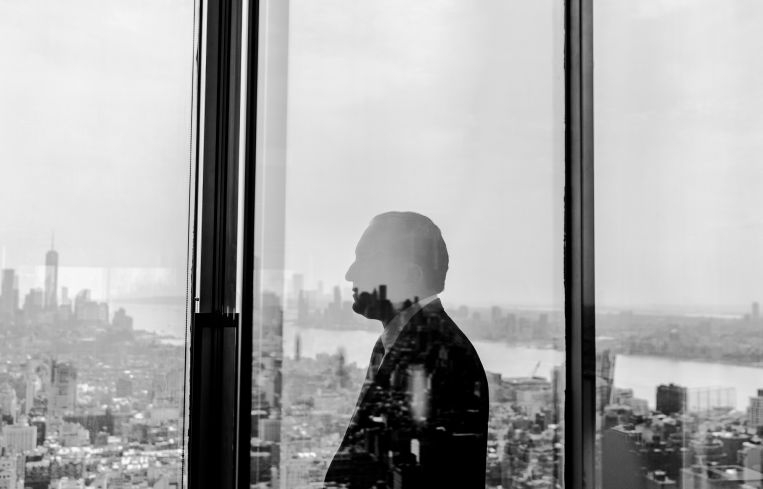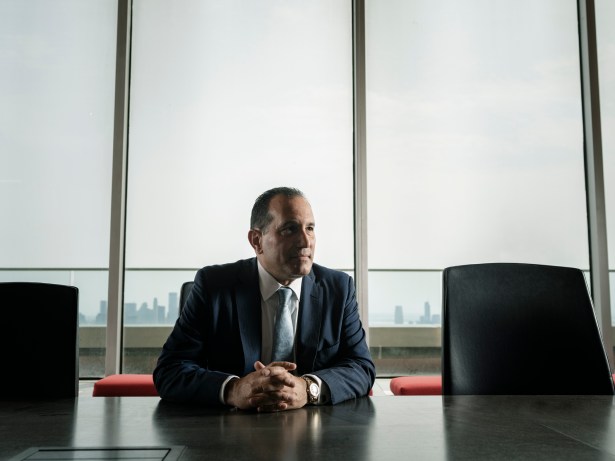Talking Diversity, Green Construction and Safety Training with Suffolk’s Charlie Avolio
By Rebecca Baird-Remba June 17, 2019 3:08 pm
reprints
Charlie Avolio, the president of Suffolk Construction’s New York office, spends his days trying to figure out how to navigate one of the city’s fastest changing industries.
New York City not only has some of the highest construction costs in the country; it is also governed by a constantly growing mess of regulations that include complex zoning and building codes, construction safety regulations and carbon emissions requirements. This year, construction companies have to adapt to new laws that require landlords to dramatically reduce their energy usage, which means constructing or retrofitting buildings with new, greener technology and materials. The industry also has to comply with a two-year-old law that requires workers on all construction sites to complete at least 40 hours of safety training and to carry cards certifying that they have done so.
Since starting at Suffolk three years ago, Avolio has helped the company land a number of major New York City jobs, including work on Cammeby’s 532 Neptune Avenue, one of the tallest residential towers in southern Brooklyn, and RAL Development’s Union Square Tech Tech Training Center. Before Suffolk, the 55-year-old, married father of two and Valhalla, N.Y., resident spent nearly three decades at Turner Construction.
We got on the phone with Avolio last week to talk about what projects his firm is working on, how Trump administration policies are affecting the construction industry, a looming slowdown in luxury residential development and how the new carbon emissions legislation and construction safety requirements are shaping Suffolk’s approach to construction.
Commercial Observer: What are some of the big projects that Suffolk is involved in?
Charlie Avolio: In New York, we’ve had some really good success over the last over the last four years.
Most recently, we’ve opened up the Kartrite Resort and Indoor Waterpark in Monticello [N.Y.] That was for EPR Real Estate. We’re just finishing up the Summit apartment building for BLDG at 222 East 44th Street. That project is being occupied now. Just opened up The Landing at Pier 6 in Brooklyn for RAL; that’s a 140-unit affordable apartment house. And we’re in the process of opening the second building there at Pier 6, called the Quay, which is a 120-unit condominium.
We’re in the education sector. Two projects for NYU, the School of Global Studies at 404 Lafayette Street. And we’re in the process of opening up for 370 Jay Street in Brooklyn for them, which is a renovation that will include a media center and the Tandon School of Engineering.
And you’re working on the big, 40-story residential and retail project on Neptune Avenue, right? How’s that going?
Yes, we’re working at 530 Neptune Avenue in Coney Island. The first phase of the job is the retail podium, which has been completed [and we’re] in the process of closing out that job.
And we’re getting ready to break ground at 14th and Irving, which is a commercial office building that will be a part of the New York City’s Tech Center. The project right now is in the demolition phase and will break ground in the next several months; that is also for RAL Development.
So out of all of these, are there any projects that are particularly challenging, from a technical perspective?
The project at 14th and Irving is right next to the L train, where the city’s doing a reconstruction of the train tunnel between two existing buildings. So, it brings its logistics challenge to it. We tend to spend a lot of time during the pre-construction phase and through the design phase to bring as many innovative solutions that we can to the logistics and the scheduling and the budgeting of the project for success.
What has been your experience with the new safety training requirements, the deadline of which was just extended to next year? Workers on all sites will have to do 40 hours of safety training by 2020.
Our team at Suffolk has welcomed the New York City’s increased focus on safety training. We already prioritize our safety and have been leading the way on really changing the culture around job site safety both for the workforce and certainly for the public outside the fence. I think it’s going to bring an overall positive impact to the industry in the New York market. We put all of our field personnel through the training requirements that were put forth by New York City. We supported the adjustment [of the deadline] so we can continue to ensure that the workforce is entirely trained up to speed. So, it’s something that we think is going to have a very positive impact on the safety, quality and overall well-being of the workforce and the public.
There’s been a lot of discussion of the tariffs on Chinese steel and how that’s impacted the construction industry. Do you have a sense of whether that’s made jobs more expensive?
When it when it comes to national issues like tariffs, I believe that they’re not a long-term threat. We do see adjustments in [prices for] both raw materials and fabricated materials from outside of the U.S. And unfortunately, that [cost] gets passed onto the projects, to us, and to our clients. But I think over the over the longer term, they’ll continue to work themselves out and not have a [lasting] effect on either revenue or pricing.

The City Council just passed a law that’s essentially going to require building owners to significantly reduce their carbon emissions over the course of the next 20 years. Do you have any sense of how that’s going to affect construction practices? Maybe the industry will have to embrace new technologies or greener ways of doing things?
I think it’s an evolution. Fifteen to 20 years ago, [we saw] the installation of green building technology and sustainable construction. Now we’re seeing a lot more RFPs come out with higher standards of LEED Gold and Platinum [for] buildings, and sustainability and smart buildings. So, I think it’s a natural evolution. And I think we need to look at engineering technologies and innovative ideas to help them along in the course of reducing their carbon footprint. We are seeing some more buildings in a passive house design with regards to energy efficiency in the facade, the electrical system and the mechanical system.
For companies like us, it will always come back to the challenge of working more efficiently to find cost savings in other places, and to help to offset any increases due to materials or more stringent design elements.
So ultimately, it’s about finding ways to do cost-effective engineering for those new kinds of facades and other energy-saving tech.
I don’t believe it’s going to be an easy solution. I think the entire industry—from the real estate side to the architecture engineer and contractor side—[needs] to really work collaboratively to find ways to mitigate the cost.
How do you think the construction industry is doing in New York City? Compared to five years ago, do you think it’s better or worse, in terms of the number of jobs and employment?
From the market point of view, we’re still seeing a robust pace of new projects coming into the market. I do expect a correction—most likely in residential construction, for higher-end, luxury rentals and condos—over the next 12 to 18 months. I think that the correction is inevitable. However, we’re seeing some great opportunities in commercial buildings, health care, higher education, and even some smaller boutique, condominium, private projects that are in well placed locations.
Related to safety training, fatalities on construction sites are an ever-present issue in the industry. Do you think that the construction industry should be doing more to remedy that? Or do you think it’s a natural consequence of the amount of construction going on in the five boroughs?
We can never accept serious injuries or fatalities as a natural consequence to doing business. Our first and foremost focus every day is worker safety and community safety. It’s an individual effort. It’s a team effort. It’s a project effort. And, certainly, it’s an industry effort. Any serious injury or fatality on a project is something that the that the industry needs to react to. I don’t think you can ever be doing enough to focus efforts on safety. And the couple of things that we’re doing is ensuring that there’s a healthy, proactive approach to safety on a job site. We call our program Safer Together, which is really a grassroots, bottom up, person-to-person conversation with our workforce, to ensure that they understand why [they need to] work safely, not just [follow] the rules and regulations on the job. We’ve also been partnering with technology companies like Smart Bid to do predictive analysis of situations on job sites to look for preventive measures to reduce risk and reduce incidents.
There’s always a lot of discussion in the construction and real estate industries about hiring a diverse workforce. What recruitment and mentoring programs does Suffolk have to ensure that you’re recruiting and promoting enough women and people of color?
I think that it is important to be representative of the communities that you work in. For us, we have a goal to be at 51 percent women by 2024. We are involved in the ACE mentorship program, and I sit on the board of the Salvadori Center, which are both focused on STEM education for children in elementary school, middle school, high school. We also have a career start program across the country where we will take students from college, put them into a rotation in that first 18 months with the company. They’ll see project management, field supervision and safety, as well as time in the pre-construction and estimating group. So, in that first 18 months [they’ll see] many different facets of our industry. We’re looking for people that can really think critically, that can work in teams and solve problems. Those types of people really excel in the construction industry.



